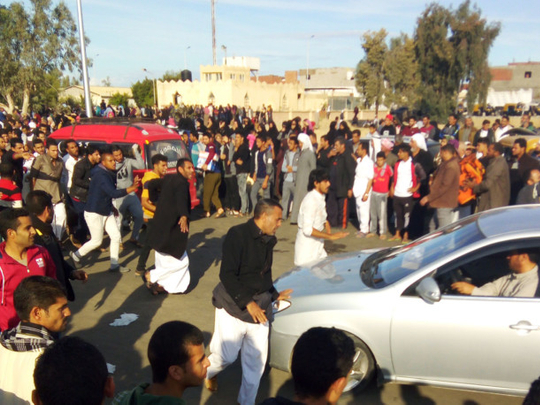
It is a terrible massacre, which took place inside a mosque in Egypt. The brutality of its execution exceeded that of the most imaginative fantasies of horror films, wrote the London-based Pan-Arab paper Asharq Al Awsat regarding the attack in Egypt. “The facts provoke both grief and anger. It is the determination to target Egypt through its security, stability and economy ... To keep the country from catching its breath. Fortunately, Egypt, with its people, army and institutions, is not in a position to bow to this wave of insanity; a wave that reminds us that terrorism is a weapon of mass destruction, and that the fountains of extremism are the wellsprings of mass destruction. One does not exaggerate when saying that the ‘massacre of worshipers’ can be repeated in more than one place, because terrorists have violated all kinds of borders and sanctities,” the paper said.
For terrorists, everybody could be a target to further their evil agenda, said the Jordan Times. “The terrorist attack in Egypt should raise awareness to an important fact: While terrorists and hardliners might be defeated on the battlefield in Syria, Iraq or elsewhere, their threats and attacks on soft targets in places where security measures are inadequate are bound to continue. Militants have been operating in northern Sinai for several years, but they mainly target security forces. The attack this time is attributed by some to the fact that Sufis, regarded by some terrorists as heretics, were regularly gathering at this mosque, an assumption supported by last year’s threat, by the head of Daesh’s [the self-proclaimed Islamic State of Iraq and the Levant] religious police in Sinai, who said that Sufis who do not ‘repent’ will be killed.”
Friday’s massacre illustrates all too well that terrorism does not differentiate between people or their religion or their nationalities, noted the Saudi Gazette. “It knows no national boundaries. It thus follows that since terrorism is not restricted to a single country, it cannot be confronted by one country alone. While vengeance is rightly sought, Egyptian President Abdul Fattah Al Sissi himself knows this is not the entire solution. Time and again, he has asserted that reducing terrorism solutions in Sinai and Egypt in general to only military and security components, as vital and necessary as these are, falls short of a more holistic approach to the crisis. Any viable and lasting solution necessitates efforts to improve people’s standard of living and the quality of their lives, as well as safeguard their wellbeing. And just as one country cannot realise security single-handedly in the face of terrorism, a comprehensive approach is needed to confront terrorism.”
There are a few points that we can derive from this cowardly terrorist attack: These terrorist groups are no longer able to execute complex terrorist attacks that would be usually carried out by a larger number of perpetrators using intricate tactics and modern weaponry, said Egypt’s Al Ahram. “The nature of the attack shows a decline in the tactical capabilities of the terrorists, which indicates that the security campaigns are paying off. The attack is a sign of the madness of these terrorists who do not even take into consideration the sanctity of an act of worship.”





_resources1_16a31069e4e_small.jpg)






